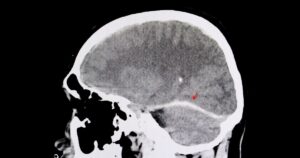This March Is Brain Injury Awareness Month
March 13, 2023 Though there are many possible causes of brain injuries, a few of the most common are car accidents, sports, and medical injuries. For some, living with a brain injury permanently alters the trajectory of their life. For others, the complications are less severe. Each March, the Brain Injury Association of American (BIAA) sponsors a campaign entitled #MoreThanMyBrainInjury. While the campaign’s primary goal is to empower disabled individuals to tell their own stories and to not let their disability define them, another one of its key functions is to promote awareness on the causes behind brain injuries and to improve care and support services for the millions of Americans who suffer from them.
Though there are many possible causes of brain injuries, a few of the most common are car accidents, sports, and medical injuries. For some, living with a brain injury permanently alters the trajectory of their life. For others, the complications are less severe. Each March, the Brain Injury Association of American (BIAA) sponsors a campaign entitled #MoreThanMyBrainInjury. While the campaign’s primary goal is to empower disabled individuals to tell their own stories and to not let their disability define them, another one of its key functions is to promote awareness on the causes behind brain injuries and to improve care and support services for the millions of Americans who suffer from them.
Fast Facts on Brain Injuries
There are two main types of brain injuries: acquired brain injuries (ABIs) and traumatic brain injuries, or TBIs. An acquired brain injury is an injury to the brain that is not congenital, hereditary, degenerative or induced by birth trauma. In other words, ABIs occur after birth. Acquired brain injuries can be traumatic or non-traumatic, depending on whether physical force was involved. A traumatic brain injury, on the other hand, is any alteration in brain function (or other evidence of brain pathology) that is caused by external force or trauma.
Here are some examples from the BIAA on some of the most common causes behind traumatic brain injuries:
- Assaults
- Falls
- Motor vehicle accidents
- Sports or recreation-related injuries
- Workplace injuries
Unlike TBIs, acquired brain injuries usually result from infectious disease, stroke, meningitis, encephalitis, seizure, electric shock, tumors, lack of oxygen, and aneurysm.
People who experience acquired or traumatic brain injuries can experience a wide range of symptoms. The Centers for Disease Control and Prevention (CDC) report that some of the most common symptoms of moderate to severe brain injuries include – but are not limited to — the following:
- Difficulty understanding and/or thinking clearly
- Trouble communicating and/or learning skills
- Problems concentrating and/or difficulty remembering information
- Weakness in the arms and legs
- Problems with coordination and balance
- Problems with hearing and vision
- Feeling more angry or aggressive than usual
- Experiencing sadness, depression, nervousness, and/or anxiety
According to the BIAA, there are more than 5.3 million Americans living with permanent brain injury-related disabilities. Moderate to severe brain injuries are notorious for causing a slew of complications for survivors. For example, when someone sustains a brain injury their life expectancy decreases by 9 years. Per the CDC, other known TBI-related complications include:
- A marked increase in the likelihood of dying
- 57% of survivors are moderately or severely disabled
- 55% do not retain their employment, though they were employed at the time of the injury
- 50% return to the hospital for care at least one time after their initial injury
- One-third of individuals need help with their day-to-day activities
- 12% reside in nursing homes or other skilled nursing facilities
When to Talk to a Lawyer
Every day, people sustain brain injuries related to car accidents, sporting incidents, falls, and more. While some of these incidents are unavoidable, others are the result of negligence. For example, if a person sustains a brain injury at work because of their employer’s failure to provide protective gear or training, it is a good idea to speak with an attorney about filing a claim. At Galfand Berger, our attorneys have decades of experience representing injured victims:
- Our firm recovered $10 million for a construction site accident victim who suffered a fatal brain and skull injury.
- We also recovered $4.7 million for a crane operator injured in the workplace.
Philadelphia Personal Injury Lawyers at Galfand Berger, LLP, Representing Injured Victims Since 1947
If you have questions about filing a claim for injuries you sustained, contact the Philadelphia personal injury lawyers at Galfand Berger LLP today. Call us at 800-222-USWA (8792) or fill out our online form for a free consultation. Located in Philadelphia, Bethlehem, Lancaster, and Reading, we serve clients throughout New Jersey and Pennsylvania, including Allentown and Harrisburg.
 Google Screened
Google Screened
